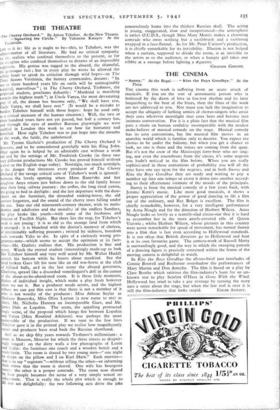THE THEATRE
The Cherry Orchard." By Anton Tchehov. At the New Theatre. -" Squaring the Circle." By Valentine Katayev. At the Vaudeville.
LIFE as it is : life as it ought to be—this, to Tchehov, was the subject-matter of all literature. He had no critical sympathy for the realists who confined themselves to the present, or for the escapists who confined themselves to dreams of an impossible happiness. His genius was tagged to the absurd, the shameful, the grotesque fact ; but in every play he wrote he allowed the aching heart to speak its criticism through wild hopes—in The Three Sisters Vershinin, the battery commander, dreams : " In ow or three hundred years life on earth will be unimaginably beautiful, marvellous " ; in The Cherry Orchard, Trofimov, the perpetual student, proclaims defiantly : " Mankind is marching awards the highest truth "; in Uncle Vanya, the most devastating jay of all, the dream has become only, " We shall have rest, ncle Vanya, we shall have rest." (It would be a mistake to urden Tchehov himself with those hopes : hope he used only s a critical measure of the human situation.) Well, the two or ree hundred years have not yet passed, but half a century has, nd through the eyes of another Russian playwright we were nabled in London this week to see how far humanity had ravelled. How right Tchehov was to put hope into the mouths f the weak, the futile, the unbalanced.
Mr. Tyrone Guthrie's production of The Cherry Orchard is t-rate, and to be remembered gratefully with his King John. nce again he is helped by an admirable cast without a weak and by the settings of Mr. Frederick Crooke (in these two cry different productions Mr. Crooke has proved himself without rival on the English stage today). Nostalgia, too much nostalgia, the danger that threatens every producer of The Cherry rchard if the savage critical core of Tchehov's work is ignored : etween the lovely opening when Mme. Ranevska and her aughter Anya return just before dawn to the old family house fter their long railway journey : the coffee, the long tired yawns, e going to bed in daylight : and the last departure with the dust- heets on the furniture, the shrouded rocking-horse, the old rvant forgotten, and the sound of the cherry trees falling under e axe. Into our old nineteenth-century theatre, with its melo- mas and adulteries and the morality of the endless Sundays, e play broke like youth—with some of the freshness and yricism of Twelfth Night. But there lies the trap, for Tchehov's work is not young : it is as old as the strange land from which
t emerged : it. is bleached with the doctor's memory of cholera,
f interminably suffering peasants ; twisted by sickness, boredom eels towards Yalta to die. In spite of a curiously wrong pro- ramme-note—which seems to accept the optimism at its face- alue—Mr. Guthrie realises that. His production is fine and ervy. Watch the eternal student (interestingly made-up to look Tchehov himself and very well acted by Mr. Walter Hudd) scratch his bottom while he boasts about mankind. See the 'red broken Gaev lift his nose like an old war-horse at the click of billiard balls, and in the last scene the absurd governess, Charlotta, sprawl like a discarded ventriloquist's doll in the corner of the about-to-be-abandoned room. It is these little moments, ashes of individual insight, which make a play fresh however ften we see it. But a producer needs actors, and the highest ibute we can pay this cast is that there is not a member of it ho is not worthy of the producer : Miss Athene Seyler as Madame Ranevska, Miss Olive Layton (a new name to me) as ya, Mr. Nicholas Hannen an incomparable Gaev, and Mr. ames Dale as Lopahin. The scene, the appalling protracted ragic scene, of the proposal which hangs fire between Lopahin and Vanya (Miss Rosalind Atkinson) was perhaps the most morable of the production.• If we turn to the few lines chehov gave it in the printed play we realise how magnificently actors and producer have read back the Russian shorthand.
And so we skip fifty years towards Trofimov's millennium : a oom in Moscow, Moscow for which the three sisters so despair- gly longed : on the dirty walls a few photographs of Lenin and Stalin: the furniture one couch and a wooden bench and a wash-basin. The room is shared by two young men—" one night sleeps on the pillow and I on Karl Marx." Each marries— at is to say " registers "—without telling the other—or informing eir wives that the room is shared. One wife has bourgeois tastes : the other is a proper comrade. The room now shared by four people becomes the scene of a very simple sexual re- Justment. That is really the whole plot which is enough to one act delightfully : the two following acts drive the joke
remorselessly home into the thickest Russian skull. The acting is young, exaggerated, slow and inexperienced—the atmosphere is rather O.U.D.S., though Miss Mary Morris makes a charming comrade who owns nothing but a toothbrush and a toothmug wrapped in a face-flannel. As for Mr. Peter Ustinov's production, it is chiefly remarkable for its invisibility. Illusion is not helped when a curtain, supposed to divide the room, is as invisible to the actors as to the audience, or when a hungry girl takes one nibble at a sausage before lighting a egarette.
GRAHAM GREENE.


























 Previous page
Previous page